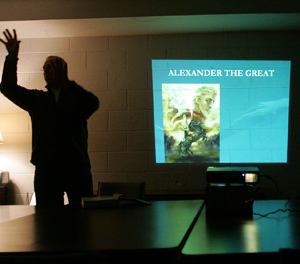DELAVAN — It was a Monday evening, and a small group of people gathered in the basement of the rectory at St. Andrew Church waiting for Bible study to begin, chatting about their weekend and exchanging comments about the last meeting.

But the tiny room was quiet despite all the chatter. Instead, the air was filled with hand gestures as members signed to one another in American Sign Language. Most of the people in the study group are deaf and they come once a month at 6:30 p.m. to interact and discuss the Bible in their own language.
About 15-20 deaf people usually attend the class in Delavan. Under the direction of Deacon David Sommers, the only deaf deacon in the Milwaukee Archdiocese, a recent class on the Book of Revelation addressed understanding complex text, translations, questions and answers.
“It’s great being able to worship like hearing people,” seminarian Chris Klusman, a member of the deaf Bible study, said through an interpreter. “When we come to the Bible study, we can talk to each other directly and not through an interpreter; I feel more personally involved in the discussion.”
With nearby Delavan School for the Deaf, the number of deaf Catholics attending St. Andrew is a bit atypical for the archdiocese. While St. Andrew provides several interpreters to translate the Mass, using American Sign Language, for deaf Catholics, the amount of their involvement is limited in the ability to participate directly.
“I come here once a month to do the homily,” said Deacon Sommers, a member of St. Matthias Parish. “But I have other parishes to travel to, so it isn’t the same as being there each week to be there for the deaf members.”
Because of the limited availability of deaf resources, the Bible study is paramount to bringing the Catholic faith and community to a group of people who are often excluded from traditional worship.
Deacon Sommers and his wife Susan, also deaf, began holding the Bible studies five years ago for a group open to discussing God’s word in a way that was relevant to their lives.
“For me, the concepts of the deaf help me get a picture of what is being talked about,” said Barbara Ryser. “When I attend someplace with the hearing, I watch the interpreter and listen as everything flies by me. I just don’t get the picture of what is really going on.”
For the parish deaf religious education coordinator, Patty Kostechka, who also serves as a deaf interpreter, the studies bridge the gap normally lost among the youth.
“I am a hearing person, but sometimes I notice that when we are teaching deaf children religion, that they don’t have the background and knowledge because they didn’t have the reinforcements of their faith as they grew up,” she said. “They are not stupid, but they are not participating because when they have to do so through an interpreter, they are afraid to participate or don’t realize that they have the freedom of expression to ask questions.”
Members are quick to praise interpreters for the difficult jobs they do, but they also recognize their limitations. Because interpreters need to listen to the hearing person first and give translations, there is a lag time for the deaf individual and often by the time the deaf person is ready to respond, the speaker is already onto another topic. The situation can be frustrating and isolating for the deaf.
“The interpreters are never lousy, but sound waves travel much faster than hand movements,” said Klusman. “There is a lot of lag time and the full concept doesn’t always make sense so it takes time to get the whole idea and take ASL and phrase it into English.”
Immersion into the hearing world poses other difficulties, even for those who are unafraid to participate in discussions.
While most individuals blessed with the gift of hearing are accustomed to others interrupting their conversations, the deaf are not and often feel as if their voice is not as important as the next person’s.
“Even when I was attending seminary to become a deacon, it was difficult,” admitted Deacon Sommers. “There were lots of people at the lectures; all of them were hearing except me. They would raise hands and cut in and here I was with an interpreter and the lag time, and it was very hard to participate. Even though my time is limited and once a month Bible studies are not enough, I try to find any way that I can to meet the needs of the deaf who are out there.”
St. Andrew provides four interpreters who rotate every Sunday. These interpreters put in many hours before the Mass preparing so the deaf can get a comprehensive, accurate church experience. Despite those efforts, deaf Catholics find it difficult to feel a sense of community among the hearing members of the parish. The Bible study meets some of those needs.
“I think if they were just attending a Bible study with an interpreter, it would be good, but they would tend to daydream and maybe not pay attention,” said Deacon Sommers, who prepares a Power Point presentation for each session. “But, with a deaf deacon, they pay attention.”
For Roxanne North, the opportunity to attend the Bible study has given her a sense of family and a greater foundation in her faith and in the history of the church.
“It is so interesting,” she said. “These classes have helped both my faith and my understanding of Scripture – something I had trouble with before.”
All Catholics fluent in American Sign Language are welcome to attend the Bible study for the deaf at St. Andrew Parish.
